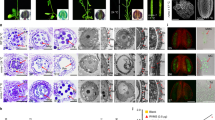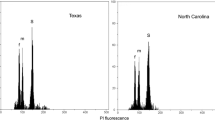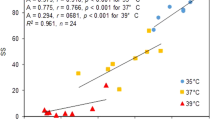Abstract
IT is well known that treatment with ‘growth hormones’ reduces the fertility of plants. Not only do the ‘auxins’ seem to be antagonistic to the initiation of flowering, but also they reduce the number of seeds that develop from treated flowers, or they may cause total sterility. This effect is used in blossom-thinning sprays and in the production of parthenocarpic fruits.
This is a preview of subscription content, access via your institution
Access options
Subscribe to this journal
Receive 51 print issues and online access
$199.00 per year
only $3.90 per issue
Buy this article
- Purchase on Springer Link
- Instant access to full article PDF
Prices may be subject to local taxes which are calculated during checkout
Similar content being viewed by others
References
Moore, R. H., Science, 112, 52 (1950).
Naylor, A. W., Proc. U.S. Nat. Acad. Sci., 36, 230 (1950).
Laibach, F., and Kribben, F. I., Ber. deutsch. bot. Ges., 62, 53 (1949); 63, 119 (1950).
Author information
Authors and Affiliations
Rights and permissions
About this article
Cite this article
REHM, S. Male Sterile Plants by Chemical Treatment. Nature 170, 38–39 (1952). https://doi.org/10.1038/170038a0
Issue Date:
DOI: https://doi.org/10.1038/170038a0
This article is cited by
-
Sex Expression and the Production of Ethylene induced by Auxin in the Cucumber (Cucumis sativum L.)
Nature (1969)
-
Beobachtungen �ber m�nnliche Sterilit�t bei der Sonnenblume (H. annuus), ausgel�st durch genetische, physiologische und induzierte chemische Faktoren
Theoretical and Applied Genetics (1969)
-
Versuche zur Induktion von Pollensterilität bei den Selbstbefruchtern Sommergerste, Sommerweizen und Hafer
Der Züchter (1967)
-
Die Bedeutung der Pollensterilität in der Maiszüchtung
Der Züchter (1962)
-
Gametocidal action of dichloroacetic acid
Euphytica (1962)
Comments
By submitting a comment you agree to abide by our Terms and Community Guidelines. If you find something abusive or that does not comply with our terms or guidelines please flag it as inappropriate.



